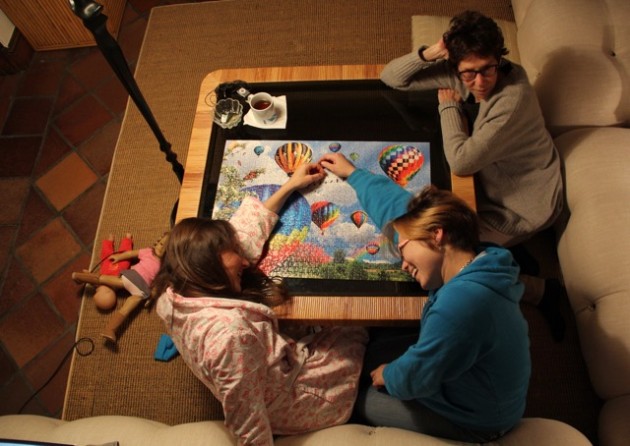
by Marlena Maduro Baraf
A Mother’s Day Love Letter to My Daughters-in-Law

“The DIL/MIL relationship is a new piece in the universe of connections.”
We begin by sorting and piling up the tiny cardboard pieces. Emily searches with her eagle eye for textures—the folds of fabric in a velvet gown. Brushstrokes. Hair. Kelly looks for like-minded colors; I, for the straight-edge pieces. Daydreaming, one of us will catch sight of a perfect interlocking pair in the chaos of the box. “First One!”
During school break in December, our sons and their families land at our small house in New York. The rooms fill with children’s voices, Lego parts and Barbies. We eat serial breakfasts that last all morning, bake walls and roofs for the gingerbread houses the children will decorate with miniature candy, and manage to subdue any uncomfortable disagreements among the children or adults. Inevitably, someone has brought a 2000-piece puzzle, and during the visit, Emily, Kelly, and I lock ourselves in mind-numbing togetherness at the glass coffee table in my living room.
Emily and Kelly are my DILs. I’m their MIL. I have two daughters-in-law, two sons, and four grandchildren. Until recently I didn’t use the shortcut DILs; I learned this from the young. When Kelly said two years ago only half jokingly, “My MIL would not want that,” I got a surprising hint at the filter through which she was seeing me.
Could it be that the discomfort between in-laws lies in the name? Mother-in-law becomes not-like-mother, mother-once-removed, mother-to-beware-of…. Same for DILs. The reality is that a family clan has to get used to an outsider, and an outsider has to get used to the established patterns of a family. The DIL/MIL relationship is a new piece in the universe of connections that really is not meant to replace the mother/daughter bond.
I am Jewish and Latin American. How can you beat that for family? Growing up in Panama, family was abuela, tías, tíos, primas y primos. If there was hurt and sadness within your “nuclear family” (a bizarre term in the context of family then), there were many others to come to the rescue with caring. Last November, our sons and their wives traveled with us to Panama for my niece’s wedding. The grandchildren, included in the wedding party, are beginning to build bridges with their extended family in Panama. Take all the love you can get.
There are glitches of course, small ones; sometimes big ones. Our sons have changed after living with women who are not me. One of them will come into my kitchen smelling the milk, sniffing the glasses, looking for the expiration date on the eggs. “I just bought the eggs!” I burst. The loving moments far outweigh any stumbles up ahead.
“Emily can rebuild a car. She’s not at all like the girls at home,” our son wrote from California soon after meeting Emily. We noticed a large tattoo on her forearm in the picture of their lunch-hour wedding before a justice of the peace. Our son didn’t tell us that Emily is hilarious and whip smart, which she is. Her specialty—self-deprecating humor that is sometimes a little black. When the couple visits us in New York, my husband makes a scratch list of things in the house that need repair. Our DIL can fix anything!
“Kelly, how do I make chili with ground turkey that doesn’t taste like cardboard?” I call Kelly when I have basic ingredients and want to know what seasonings will make a dish taste right. She’s a natural cook. Kelly’s mother and father died in the year that she and my son married. These devastating losses were previewed in her teen years by the pain of her parents’ divorce. Kelly is comfortable asking favors from me, devoid of protocol. I’m comfortable considering the simple requests, no sense of obligation.
As outsiders within their in-law family, Kelly and Emily bonded naturally when they lived in nearby cities. Kelly, who loves the outdoors, will help Emily’s boys with their scooters, while Emily teaches Kelly’s girls to weave the intricate links of colorful, rubber band bracelets. My DILs have patience with each other’s children, weary as they sometimes feel at the misbehaviors of their own.
On the last day before they leave us, I wake up early to stretch my time with the children and give the parents a minor break. I take the stair treads in my socks to find Emily already hunched over the coffee table fitting the last pieces of the multi-piece puzzle. She’s been up for hours! The children are subdued. They are playing Minecraft games and on YouTube watching other kids playing video games. My sons begin gathering suitcases in all shapes and sizes. I make lunches for the road and pack leftover kid stuff. My husband is still snoring. We are tired and satisfied.
Our sons have given us the gift of bringing our daughters-in-law into our lives, affording us the privilege of another person’s company in an intimate way. We are twice blessed.
Marlena Maduro Baraf is a Jewish Latina. She immigrated to the United States from her native Panama and her perspective is colored by this dual exposure. Her writing has been published in Westchester Review, Lumina, Blue Lyra Review, and Latino Voices at the Huffington Post. You can find her at https://www.breathinginspan
The views and opinions expressed in this article are the author’s own and do not necessarily reflect those of Lilith Magazine.